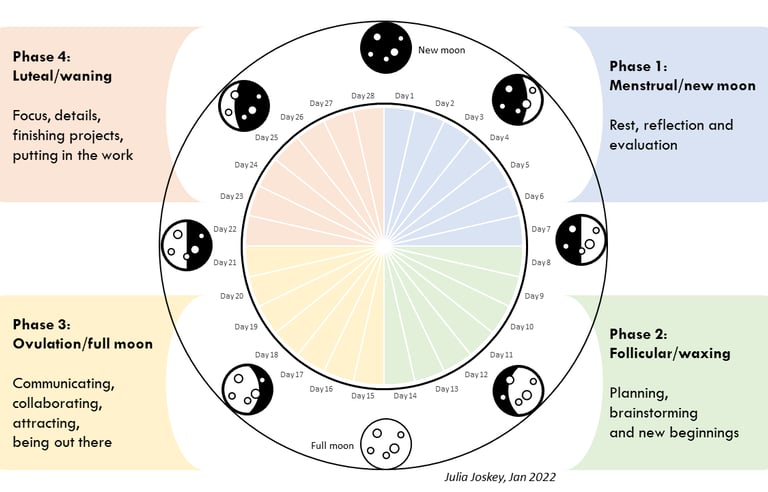Understanding the Link Between Menstrual Cycle and Mood
Many women experience a range of emotions in the days leading up to their menstrual cycle. As estrogen and progesterone levels rise and fall throughout the menstrual cycle, it can disrupt the delicate balance of neurotransmitters, leading to changes in mood. This hormonal fluctuation can make some women more susceptible to feelings of depression and anxiety.
Rachelle Tersigni
5/10/20243 min read


Understanding the Link Between Menstrual Cycle and Mood
Many women experience a range of emotions in the days leading up to their menstrual cycle. As estrogen and progesterone levels rise and fall throughout the menstrual cycle, it can disrupt the delicate balance of neurotransmitters, leading to changes in mood. This hormonal fluctuation can make some women more susceptible to feelings of depression and anxiety.
Hormonal Changes, Neurotransmitters & Mood
The neurotransmitters serotonin, dopamine, norepinephrine, and GABA are involved in regulating mood and general feelings of well-being. One of the primary factors contributing to emotional changes experienced before menstruation is the fluctuation in hormone levels. The menstrual cycle is governed by a complex interplay of hormones, including estrogen and progesterone. These hormones can have a significant impact on neurotransmitters such as serotonin and dopamine, which play crucial roles in regulating mood. When these hormonal shifts occur, especially during the luteal phase of the menstrual cycle which is the descending phase of the cycle there is a rapid decline in estrogen and progesterone levels, which predisposes some women to experiencing mood changes, including feelings of depression and anxiety.
Here is a review of the 4 phases, the hormonal changes that could lead to changes in neurotransmitters and varying states of mind-body.
Menstrual Phase (Days 1-5): Energy has descended.
Estrogen and progesterone levels are at their lowest, there can be physical pain, fatigue, headaches, mood swings, irritability, sadness, or anxiety during this phase. Serotonin levels may decrease, which can contribute to feelings of depression, irritability, and mood swings. Dopamine levels may also fluctuate, affecting motivation and pleasure.
Follicular Phase (Days 6-14): Ascending energy.
Estrogen levels begin to rise gradually and as menstruation ends, energy levels may start to increase. Mood may improve as estrogen levels rise which enhances serotonin activity, leading to improved mood and reduced feelings of anxiety and depression. Dopamine levels may increase, contributing to increased energy and motivation. However, some individuals may still experience mood fluctuations or anxiety.
Ovulation Phase (Day 14): Peak energy.
Estrogen levels peak and progesterone levels start to rise which further enhances serotonin activity, promoting feelings of well-being and happiness. Dopamine levels may also peak, contributing to heightened pleasure and reward processing. Some individuals may experience ovulation pain or heightened sexual desire. During this phase, it becomes easier to access feelings of positivity, confidence, and sociability when estrogen levels are peaking. However, others may still experience mood changes or anxiety.
Luteal Phase (Days 15-28): Descending energy.
While progesterone levels continue to rise after ovulation, estrogen levels begin to decline. During this phase there can be breast tenderness, bloating, and premenstrual symptoms (PMS) such as irritability, mood swings, anxiety, and depression. If symptoms are severe and significantly impact daily functioning this is often referred to as premenstrual dysphoric disorder (PMDD). Progesterone can influence GABA receptors, leading to a calming effect. However, progesterone may also decrease serotonin activity, contributing to mood swings, irritability, and anxiety. Additionally, fluctuations in estrogen and progesterone can affect dopamine levels, potentially leading to changes in mood and motivation.
It's important to note that not everyone experiences these phases or their associated mental health effects in the same way. Factors such as genetics, lifestyle and diet, stress levels, and underlying mental health conditions can all influence how the menstrual cycle affects an individual's mental well-being. Recognizing these hormonal influences on mood can be crucial for individuals who experience cyclical mood changes related to their menstrual cycle. Tracking your phases can help you to know how your mood could be affected depending on the phase of your cycle, which could allow for more compassion toward yourself especially during the descending phases of your cycle.
Psychological Factors and Coping Strategies
While hormonal changes and physical symptoms play a significant role in premenstrual mood changes, psychological factors can also contribute to feelings of depression and anxiety. Stress, relationship issues, and personal circumstances can amplify emotional distress during this time.
It is essential to recognize these factors and develop effective coping strategies. Engaging in regular exercise, practicing relaxation techniques such as deep breathing or meditation, and maintaining a healthy lifestyle can help alleviate symptoms of depression and anxiety. Seeking support from loved ones or professional help can also provide valuable assistance in managing premenstrual mood changes.


Intentional therapy from the comfort of your own home.
Virtual sessions in the Greater Toronto Area and across Ontario, and Quebec Canada
Telephone: 289-277-6638


Renewal: to make like new : restore one's experience to the freshness of the present, to bring vigor, to replace something old.
Instead of operating from old, outdated psychobiological and neural pathways, slowly over time, we learn to create current, updated pathways that support us to experience what we want for ourselves in life.
